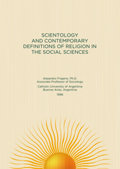Some authors have approached a definition of religion distinguishing it from other systems of meaning (understood to be such bodies of thought or theoretical tradition which give meaning to reality and to life experience). Thus, for example, Stark and Gluck (1965) distinguish between the “humanist perspectives” which constitute attempts to make significant the life of man from religions which, to the contrary, assert that they have discovered or established paths to discover the true meaning of life. The difference between some and other systems is that in the case of the humanist perspectives one looks intentionally to grant to life a meaning which is agreed upon and relatively free-willed: in the second it is presumed that the same has a pre-existent meaning to that which the individual man or social group wishes to give it and that it is possible to agree to the stated meaning. On this subject, Reginald Bibby says:
“Religious perspectives imply the possibility that our existence has a meaning which precedes that which we as human beings decide to give it. By contrast, the humanist perspective leaves to one side the search for the meaning of existence in favor of a new preoccupation with giving meaning to existence.” (Bibby 1983, 103)
From this perspective, to ask if Scientology constitutes a religion is to investigate if it postulates a meaning for the life of man which pre-exists and is considered true and immutable. In relation to this point we can note that according to Scientology, man is defined as a spiritual being. It is affirmed that man does not have a spirit but that a spirit is what the individual truly is. This spirit is called a “thetan,” a name taken from the Greek letter theta. It is asserted that the individual exists as himself as a spiritual being. The artistic capacity, the fortitude of the person and his individual character are all manifestations of the spiritual nature of the individual. The thetan constitutes the person himself.
According to Scientology, man is composed of a body, organized physical substance or composition; a mind which consists of pictures, recordings of thoughts, conclusions, decisions, observations and perceptions; and the thetan [spirit].
According to Scientology, man is composed of a body, organized physical substance or composition; a mind which consists of pictures, recordings of thoughts, conclusions, decisions, observations and perceptions; and the thetan. The thetan is conceived as the creator of things. He has animation and life even without the mind and body and uses the mind as a system of control between himself and the physical universe. Scientologists maintain that man is a thetan and the thetan is the source of all creation, is immortal and is life itself, with potentially infinite creativity and, if not part of the physical universe, having the potential capacity to control this universe composed of matter, energy, space and time.
On the other hand, Scientology explicitly asserts that training in its doctrine furnishes a comprehension of man, his potentials and the difficulties with which he is faced which goes much further than what is taught in the humanities or social sciences. With the knowledge of the principles of Scientology the person would be able to understand, for example, why some people have success while others fail, why one man is happy while another is not, and why some relationships are stable and others fall apart. Training in Scientology would permit one who would apply himself to know the mystery of life and to attain an absolute comprehension of its immortal nature. Through the teachings of L Ron Hubbard disseminated by the Church, the individual can achieve the development of all his abilities across the “Eight dynamics” postulated in its cosmic vision. These dynamics, or areas through which human activity is expressed, are:
1. The individual; 2. Family and sex; 3. Groups; 4. Mankind; 5. All life forms; 6. The physical universe; 7. Spirituality; and 8. The infinite or Supreme Being. (Scientology 0-8: The Book of Basics, pages 83–93)
The object of the teachings of the Church is to increase the level of awareness of the individual so that he can control and influence all of the dynamics of life.
In summary, like most religions, Scientology claims to have revealed the mystery of life. It does not propound an arbitrary meaning for the life of man, but claims to have discovered the true meaning. In doing so, it differentiates from humanist perspectives: It does not propound or suggest ethical norms and values to make human life meaningful. On the contrary, it claims to truly know what is man and what is the meaning of his life. At the same time, and in spite of using a vocabulary similar to the sciences, it can be clearly differentiated from these, given that it does not intend to describe how things happen, it does not formulate questions, nor present a hypothesis for its opposition and eventual modification. Rather, it claims to have discovered the true causes and invites one to share in said knowledge.





























